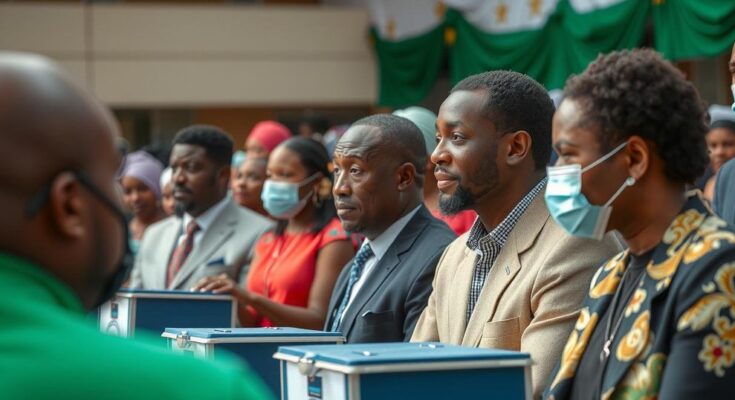Voters in Comoros are participating in parliamentary elections, following President Azali Assoumani’s controversial re-election a year prior. About 338,000 individuals are registered to vote, with nearly 100 candidates contesting. Assoumani faces accusations of authoritarianism, while some opposition parties call for a boycott, despite differing views within the opposition. Election results are expected by Friday.
Voters in Comoros are casting their ballots to elect members of the archipelago’s 33-seat parliament. This election comes one year following the controversial re-election of President Azali Assoumani, which the opposition alleges was fraught with irregularities—a claim the ruling party vehemently denies. With approximately 338,000 registered voters, polling stations opened early on Sunday, marking the first parliamentary election since January 2020. The Supreme Court has approved nearly 100 candidates to run for these seats.
Assoumani, who has wielded power since 1999, is accused by opponents of exhibiting authoritarian tendencies and allegedly grooming his eldest son, Nour El-Fath, for succession upon the completion of his term in 2029. In 2024, the president conferred significant powers upon Nour El-Fath, tasking him with overseeing all government matters. While some opposition factions, including the Juwa party led by former President Ahmed Abdallah Sambi—who is currently serving a life sentence—have advocated for a boycott of the elections, others dispute this approach.
“Hamidou Karihila, a candidate from the opposition Hope of the Comoros party, conveyed, “The Azali regime is weakened… by participating in these elections we are contributing to further exposing the flaws in its system and accelerating its inevitable fall.” Results of the elections are anticipated by Friday.
The political landscape of Comoros has been marked by turbulence and allegations of electoral misconduct since President Azali Assoumani’s initial rise to power through a coup in 1999. Assoumani’s regime has faced significant criticism for authoritarian practices and suspected nepotism, particularly with the recent empowerment of his son, Nour El-Fath, who has been given expansive responsibilities. The historical context of parliamentary activities, with the last elections dating back to January 2020, further complicates the current electoral environment. Opposition parties are grappling with internal divisions regarding participation in elections amidst calls for reform and greater democratic accountability.
The parliamentary elections in Comoros represent a crucial moment in the nation’s political narrative, underscoring ongoing tensions between the ruling party and opposition factions. With accusations of irregularities and authoritarianism surrounding President Azali Assoumani, the results of this election will likely illuminate the future trajectory of governance and public sentiment in Comoros. The dynamic between voter participation and opposition strategy will play a pivotal role in shaping the legitimacy of the electoral process.
Original Source: www.stawelltimes.com.au




